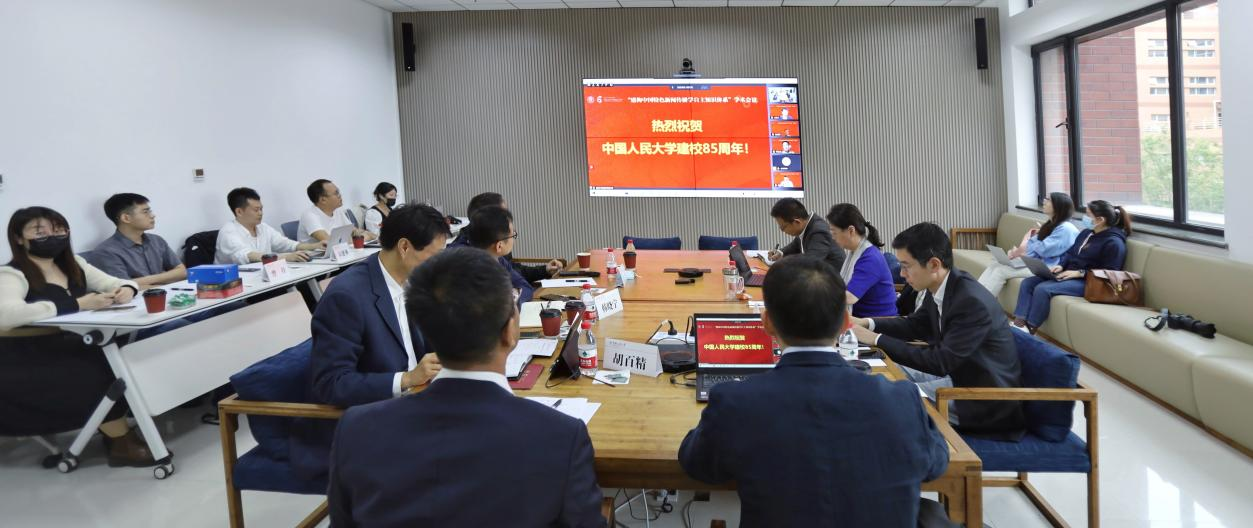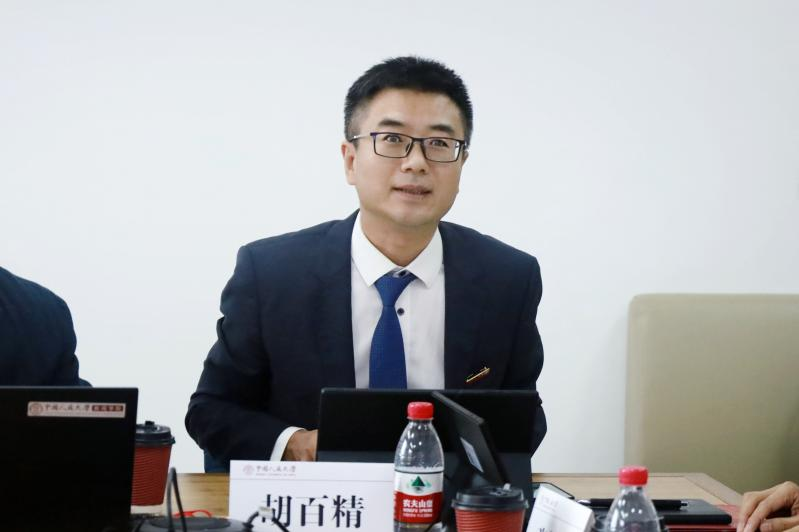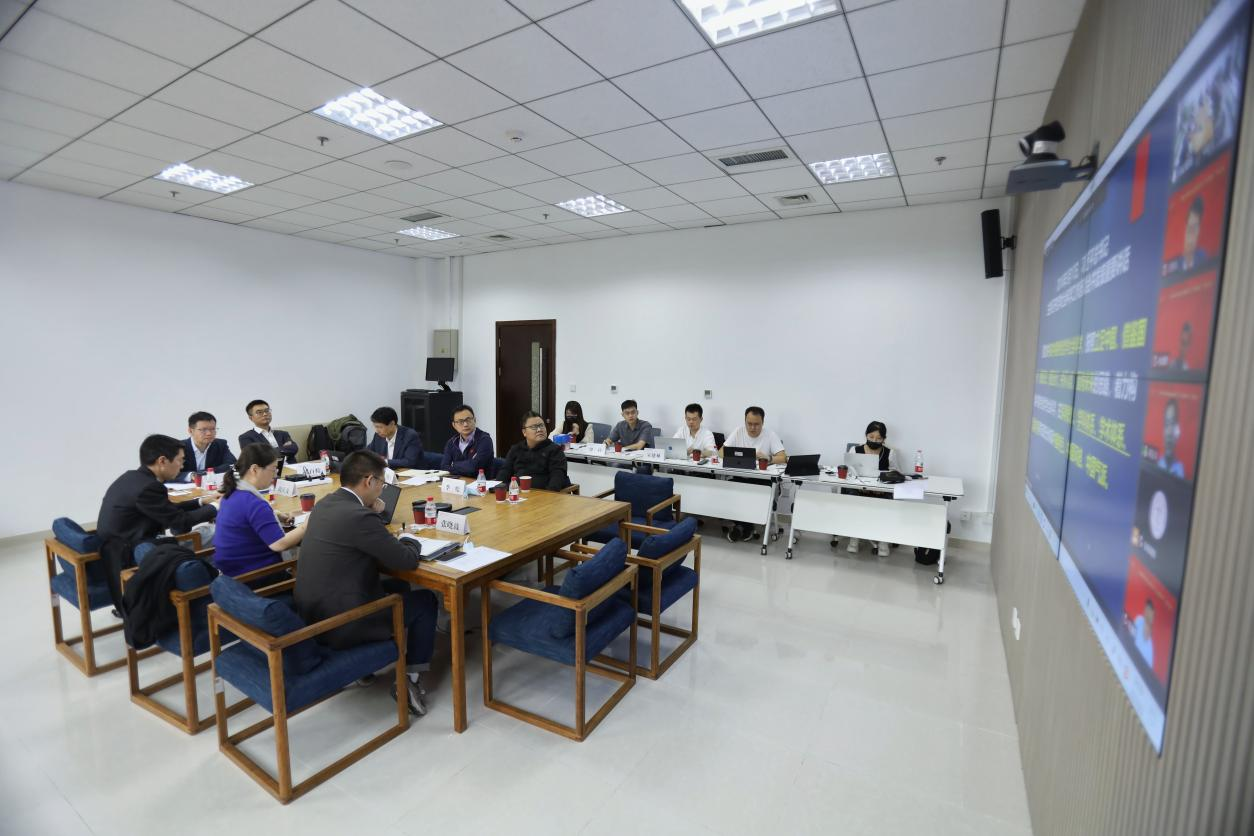85th Anniversary of the University: AnAcademic Conference about"Constructing an Autonomous Knowledge System of Journalism and Communication with Chinese Characteristics"
On the afternoon of Oct 3, the academic forum of Renmin University of China celebrating its 85th anniversary, "Building Independent Knowledge System of Journalism and Communication with Chinese Characteristics", was held. Experts and scholars from more than 10 journalism schools--including Peking University, Tsinghua University, Chinese Academy of Social Sciences, Fudan University--gathered together online and offline to discuss the construction of independent knowledge system of journalism and communication with Chinese characteristics. The School of Journalism of Renmin University of China and the Research Center for Journalism and Social Development of Renmin University of China organized the forum.

Professor Hu Baijing, Deputy Secretary of the Party Committee and Vice President of Renmin University of China, welcomed all the participating experts in his speech. He pointed out that to construct independent knowledge system of journalism and communication with Chinese characteristics,three important issuesare in need of attention. First, fully grasp the historical orientation of the construction, based on comparison and dialogues at the knowledge intersection of ancient and modern, and Chinese and Western; Secondly, the discipline of journalism and communication should be directly involved in the basic and major strategic issues such as national rejuvenation, national modernization and the construction of a community with a shared future for mankind, so as to closely align academic researches with the country’s needs and the future of human civilization. Finally, the construction of independent knowledge system ultimately lies in practice. Scholars in the field of journalism and communication should devote themselves to readingclassic books, get out of the rat race,and be patient. . They should effectively bring the results of the knowledge system construction into the classroom and hearts of young people, contributing to national rejuvenation and national modernization.

Lin Rupeng, Secretary of the Party Committee of Jinan University, said that the establishment of independent knowledge system of journalism and communication with Chinese characteristics should adhere to the guiding position of Marxist views of journalism, and should be rooted in the development history and rich practical experience of China’s journalism career. We should keep pace with the times and constantly strengthen the innovation of discipline system, academic system and discourse system. Based on China's practice, we should also embracethe world in mind and be open to the world.
Hu Zhengrong, director of the Institute of Journalism and Communication, Chinese Academy of Social Sciences, said that the construction of independent knowledge system of journalism and communication should take Marxist theory of practice as the fundamental methodology and orientation. . Practice is the origin of innovation and testing method for the construction of independent discipline system of journalism and communication studies.Allresearches should ultimately return to the road of China, the theory of China and the principle of China. Only the construction based on practice can conform to the reality of China and contribute the power of journalism and communication to the construction of the whole country's philosophy and social science knowledge system.
Zhang Taofu, dean of School of Journalism of Fudan University and deputy secretary of the party, said, studies of journalism and communication in China face a double paradox. On the one side, those studies are dependent on western theory system. On the other side, we lack of independence and a well-connected community. To build independent theories of journalism and communication of China, we should come back to current conditions and problems in China, adjust the direction according to realistic problems and focus on major issues. We should insist on coordinating knowledge, value and rules, functioning as a whole, and cooperate together to promote Chinese theory system to the level of contemporary social development.
Sui Yan, dean of School of Journalism of Communication University of China, expressed the idea of building independent knowledge system. First, we should have scientific spirit to directly face the western system, and dare to challenge and criticize. We cannot believe the west without thinking. Also, we are supposed to be confident. It is required to be based on Chinese reality, history, and future directions, and be connected with the future of both China and the globe. The popularization and socialization of Internet social media bring common opportunity for studies of journalism and communication. Sui Yan said, grasping the opportunities can be beneficial for developing original teaching and researching in practice, which could also promote the growth of the independent theory system.
Li Benqian, dean of School of Media and Communication of Shanghai Jiao Tong University, said that to build independent theory system, we should start with solving specific problems in China. Taking the case of digital literacy of people as example, it is necessary to notice both the problem of resource distribution and personal literacy, based on the situations of China, in order to execute strategy of Digital China and build our competence in the digital world. To develop digital literacy of all, an inclusive system of digital ecology should be built and shared. Being specific, not only should we focus on strategies and sharing resources, but also, we should pay attention to creating new mechanisms and how to realize goals. Together with rising the level of digital literacy, we can cover the area of time, space and living scenes, taking advantage of our national regimes, to build a high-level digital civilization.
Qiang Yuexin, dean of School of Journalism and Communication of Wuhan University, introduced his opinion. He said, from the perspective of ideology history, philosophy and social science all belong to the same knowledge system. To build philosophy and social science of Chinese character, an independent theory system of China should be built. From the perspective of the meaning of theories, the keys are independence and a theory system. Independence refers to researching into problems, journalistic practices of China, while a theory system is about the system of a disciplinary, a system of research and a system of discourse. From the perspective of practical value, three points are listed. First, based on Chinese political and economic institutions and historical cultural backgrounds. Second, insist on the Two Combinations. Third, hold the stand of integration development. Fourth, attach importance to cultivating talents of journalism and communication and the system of textbooks.
“From the perspective of disciplinary autonomy in the context of interdisciplinarity, the construction of an autonomous knowledge system in journalism and communication should adhere to the dialectical unity of disciplinary autonomy and national autonomy,” said Zhou Qing’an, dean of School of Journalism and Communication of Tsinghua University. In terms of national autonomy, it is necessary to consider both the independence of Chinese disciplinary development and the construction of Chinese national identity under the mapping of international society. For the construction of disciplinary autonomy, it is essential to adhere to the “narrative-based” principle, prioritize closed-loop development, adopt technical discourse, prevail in practice and ensure Chinese identity.
“The construction of an autonomous knowledge system is presented systematically as innovations of knowledge, theories, and research methods,” said Chen Gang, dean of School of Journalism and Communication of Beijing University. It is essential to adhere to problem-oriented Marxism theory and method, while discerning concepts, constructing frameworks, innovating theories, and summarizing experiences of digital development. During the construction, interdisciplinarity and exchanges with overseas researchers are also required.
“We need to adhere to the coherence of ‘knowing and doing’,” said Zhang Mingxin, dean of Journalism and Information Communication School of Huazhong University of Science and Technology. He highlighted the importance of grasping the unique features of Chinese journalism and communication practice while paying attention to critical cutting-edge issues in the industry.
According to Zhou Yong, executive dean ofSchool of Journalism and Communication of Renmin University of China, the ontology and substance, connotation, and extension of journalism and communication are to be further sorted out at the level of the existing pattern of journalistic professional activities, the knowledge map of the past journalism and communication disciplines, the transformation of social contexts driven by the technological revolution, and the practical turn of journalism as a paradigm. The basic orientation of the journalism and communication knowledge system is to reconstruct internally a conceptual system with Chinese characteristics and universal significance and to expand externally a problem domain oriented to external needs on two levels. The construction of a basic theory of journalism and communication with Chinese characteristics, the innovation of problem-oriented knowledge, and the new writing of Chinese journalism and communication history are the focal points for the development of an autonomous knowledge system in journalism and communication.
Bothprofessorsand studentsparticipated in the academic conference, includingWang Runze, Han Xiaoning and Li Biao, deputy deansof School of Journalism and Communication of Renmin University of China, Zhang Xiaobo and Yan Yan, deputy party secretariesof the faculty andother faculty members.

Translator:Lan Zishan; Yuan Jiabei; Zheng Shuyi
Editor:Zhao Wenzhen; Zheng Keyi;Song Siyi; Zhou Minhua



